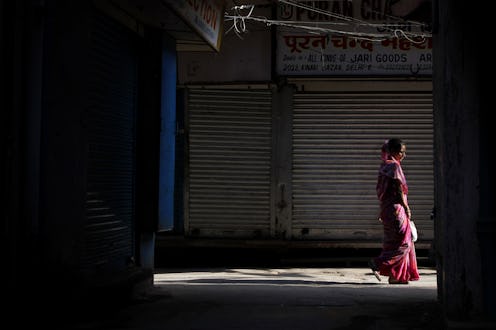News
India Has Approved The Death Penalty For Child Rapists

Amid nationwide public outrage over the country's rape crisis, the Indian government approved the death penalty for the rape of girls under the age of 12 following an emergency meeting Saturday. India's cabinet also approved doubling prison sentences to create a more drastic punishment for those convicted of raping girls below the age of 16. India's tougher rape laws aims to combat the ongoing rise of sexually violent crimes happening in the country.
"[The] government has taken serious note of incidents of rape in various parts of the country," Reuters reported a document outlining the cabinet's ordinance said. "While expressing deep anguish over such incidents, it has been decided to devise a comprehensive response to deal with the situation."
According to Reuters, Indian Prime Minister Narendra Modi called his cabinet in for an emergency meeting amid widespread outrage and demand they address the increase in violent crimes against women. To officially become law, the ordinance passed by the cabinet Saturday must be signed by President Ram Nath Kovind and approved by India's parliament within six months. However, according to the Guardian, the ordinance can still be used to prosecute and sentence suspected rapists during that six month period.
The cabinet's move to toughen India's rape laws comes on the heels of a slew of recent rape cases involving young girls, including the rape and murder of an 8-year-old girl in Jammu-Kashmir, the alleged rape of a girl by a member of parliament in Uttar Pradesh, and the death of an 11-year-old girl in Gujarat following a sexual attack. The attacks drew widespread public outrage and spurred Swati Maliwal, chairwoman of Dehli's Commission for Women to stage a hunger strike beginning April 13 in demand of tougher rape laws.
The country has struggled to combat its rate of violent crimes against women since the 2012 gang rape and death of a woman in New Delhi shocked both the nation and the international community. According to Reuters, there were at least 40,000 rapes reported in India in 2016 and 40 percent of them involved children.
In 2013, the four men convicted in the 2012 New Delhi gang rape case were all sentenced to the death penalty. According to the BBC, the judge presiding over the case argued that the barbaric nature of the men's crime justified the use of capital punishment. Although India's Supreme Court upheld the lower court's ruling and death penalty sentencing in 2017, the sentences have reportedly not yet been carried out.
Along with approving the use of the death penalty in rape cases involving girls below the age of 12, the cabinet's ordinance also called for increasing the minimum punishment in other instances of rape. In cases involving girls below the age of 16, the ordinance raised the minimum prison sentence from 10 years to 20 years. In cases involving women 16 and older the sentence was raised from seven years to 10 years. According to Reuters, there was no mention of punishments for rape cases involving male victims.
The cabinet's ordinance also included a recommendation to impose a mandatory two-month deadline on both rape investigations and rape trials in a move to combat delays in cases and chip away at the high number of rape cases currently moving within the country's justice system. According to the Associated Press, there are more than 30 million rape cases currently pending in Indian courts.
Other efforts to quicken the Indian judicial system's processing of rape cases were also approved by the cabinet, Reuters has reported. These included an increase in the number of appointed public prosecutors and an order requiring police stations have forensic kits to aid investigations of rape.